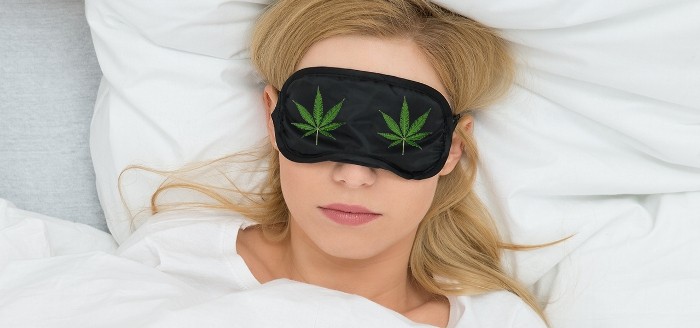Cannabis
Do Stoners Dream Of Stoned Sheep? Cannabis & Sleep
Cannabis is often touted as the miracle plant that makes almost everything better, including sleep. Some consumers are adamant about their herbal nightcap—it helps them sleep like a baby. In fact, sleep disorders are one of the most common reasons patients seek medical marijuana cards in the first place. As anyone who has ever enjoyed a few daytime tokes can attest, cannabis definitely does have a certain sedative quality. Various studies dating back to the 1960s have demonstrated that cannabis may indeed assist in falling asleep, and can also help consumers stay asleep through the night. But what is it about cannabis that makes us so sleepy? How do a few tokes or an edible before bed actually affect our sleep? And why? In this article we’ll explore these questions about Cannabis & Sleep and more.
FEEL THE (THC) BURN
Anybody who has ever smoked a joint or eaten a weed brownie can tell you about the “burnout” that follows the high. This couch-locking, sleep-inducing state of being (“burnt out”) is caused by THC, and is the primary means by which cannabis promotes sleep.
However, that sleep-aid isn’t a given. Some strains, sativas in particular, can actually boost energy and mental activity for the duration of the high, and those thought tangents about cultivating an ant farm aren’t going to help you drift off anytime soon. While many strains are prescribed as being useful in treating insomnia, they should be consumed an hour or two before you actually plan to fall asleep. This way, the burnout should be delivered right on time.
While THC is the most well-known and studied cannabinoid, there are others to consider . . . and they aren’t all equal when it comes to sleep. For example, CBD is the second most abundant cannabinoid, and it has a very different effect on sleep. CBD has been observed to actually increase alertness, and has been suggested as a treatment for drowsiness and excessive daytime sleepiness. Additionally, at least one study has suggested that high-CBD strains are actually associated with insomnia, and may be responsible for causing trouble falling asleep.
When sleep is your concern, high-THC strains are undoubtedly the best option.
MORE THAN SIMPLE SEDATION
One thing to keep in mind is that it’s not only the specifically sedative effects of cannabis and the burnout which help sleep—cannabis provides a score of other sleep-friendly effects.
When you have trouble sleeping, there is often an identifiable cause. Pain, discomfort, stress, and nausea are all common culprits—and what do these symptoms have in common? They are all treatable with medical cannabis. By numbing pain or easing mental tension, cannabis helps you on the way to peaceful sleep without even taking its sedative effects into consideration.
So, before we go parading cannabis around as the ultimate sleep aid (though it might very well be just that), we should also bear in mind that cannabis’ ability to induce and improve sleep may lie largely in its multiple medical applications which are already well-known.
SATIVA WHEN YOU’RE UP & ABOUT; INDICA TO GET DOWN & OUT
Decades of anecdotal evidence exists that irrefutably establishes indica strains as the go-to for improving sleep. Conversely, sativas are often attributed with energy-boosting effects, such as improved focus, creativity, etc. Strangely, nobody really knows why these strains have such different effects on us.
As both sativas and indicas can contain identical amounts of THC, the leading theory is that indicas contain “sleepier” terpenes. Terpenes are organic compounds found in many plants, including conifers and cannabis, and are responsible for not only a particular strain’s aroma, but also its unique spread of specialized effects. While research is yet to conclusively establish exactly how they do it, it is theorized that indicas contain terpenes that promote sleep in much the same way as some herbs, such as chamomile. When these terpenes are combined with the sedative qualities of THC, we get nature’s ultimate sleep aid.
STONERS MIGHT NOT DREAM AT ALL
Numerous studies have suggested that THC prevents REM sleep, and thus inhibits dreaming. REM stands for rapid eye movement, and connotes a phase of sleep that is specific to mammals and birds—it is characterised by (you guess it) rapid movement of the eyes, increased movement of the body, rapid breathing, and increased and more vivid dreaming. Any dream that you can recall after waking up probably occurred during REM sleep.
While this may be a little inconvenient for dream devotees, it could be very helpful for some, including patients seeking relief from nightmares associated with PTSD. This is currently one of the most active areas in terms of studying the medicinal benefits of cannabis, and we can expect interesting results in the coming years.
AGED TO SEDATIVE PERFECTION
Ever notice how your dried out, old weed makes you extra sleepy? That’s not just you. As THC degrades over time, it converts to cannabinol (also known as CBN). CBN is even more sedative than THC—upwards of five times more sedative according to most sources! This sedative property may make your stoned walk in the woods a little less enjoyable, but it does make CBN extremely interesting to researchers who are delving into its potential medical applications, which very likely include such conditions as chronic insomnia. Considering the dangerous nature of pharmaceutical sleeping pills, CBN may be a literal life-saver in this regard.
WE DON’T KNOW MUCH
So what do we know about cannabis and sleep? We know that there is no single quality of cannabis that makes it a great sleep aid, but rather a combination of several elements including THC, CBN, terpenes, and its pain and stress-relieving abilities. We know that cannabis may inhibit REM sleep, and that some strains are better sleep aids than others. That’s about it.
The fact of the matter is that cannabis really hasn’t been studied as much as, say, alcohol. Due to its having been illegal in most of the world for most of the past century, comparatively few contemporary studies exist—particularly when it comes to the association of cannabis and sleep. As legal cannabis becomes readily available for study, and with the public more open about their cannabis use and interest in all of its potential applications, harder evidence—and new discoveries—will surely follow, and the list of cannabis’ medical applications will grow.
For now, enjoy the ‘Cannabis & Sleep’; deep sleep that a quality indica can provide.



Alcohol has been studied a lot more than cannabis and it’s been known for many years that alcohol causes cancer!